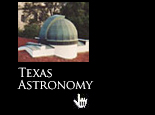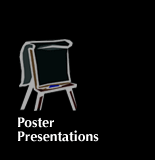Sunday, October 16th
|
7:00pm:
|
Reception (Appetizers and Drinks)
Mansion at Judges Hill
(website)
Map & Parking
(pdf)
1900 Rio Grande Blvd., (512) 495-1800
|
Monday, October 17th
|
8:45:
|
Welcoming Statements
Mary Ann Rankin, Dean, College of Natural Sciences
Don Winget, Chair, Department of Astronomy
|
|
Session I, ACES 2.302 - Judit Györgyey Ries, Chair,
bio
|
9:00-9:40:
|
Asteroids, Kuiper Belt Objects, Comets, Satellites and the Formation of Our Solar System
Scott Sheppard, Carnegie DTM
abstract
bio
|
9:40-10:20:
|
What do Multiple Planet Systems Teach Us About Planet Formation?
Eric Ford, Berkeley
abstract
bio
|
10:20-11:00:
|
Coffee & Posters, ACES 2.402
|
11:00-11:40:
|
Massive Star Formation: A Tale of Two Theories
Mark Krumholz, Princeton
abstract
bio
|
11:40-12:20:
|
Probing Chemistry During Star and Planet Formation
Jackie Kessler-Silacci, UT
abstract
bio
|
12:20-2:00:
|
Lunch* & Posters
*includes a 1 hour Q&A session
with
postdoc speakers and graduate students
|
|
Session II, ACES 2.302 - Michael Siegel, Chair,
bio
|
2:00-2:40:
|
Disks Around Young Stars
Christine Chen, NOAO
abstract
bio
Observations with the IRAS satellite serendipitously discovered that
the main sequence A-type stars beta Pictoris, Vega, and epsilon
Eridani possess 60 micron fluxes 10 - 100 times larger than expected
from the stellar photosphere alone. The discovery of infrared excess
led to speculation that these stars possess circumstellar dust
grains. Since the collisional lifetime and the Poytning-Robertson
Drag lifetime of the grains is a fraction of the stellar age, the
grains must be replenished from a reservoir, such as collisions
between parent bodies. The presence of a dusty disk around beta
Pictoris was dramatically confirmed when an edge-on disk was imaged
in scattered light. While the IRAS satellite possessed the
sensitivity to study luminous main sequence B- and A-type stars, it
lacked the sensitivity to study fainter solar-like stars. The Spitzer
Space Telescope is enabling the study of thermal emission from dust
around large samples of post T-Tauri and main sequence stars of all
spectral types. These statistical studies may constrain the
mechanisms, which currently remove micron-size dust grains and
provide insight into the processes, which sculpt young planetary
systems.
|
|
2:40-3:20:
|
Local Interstellar Medium
Seth Redfield, UT
abstract
bio
|
3:20-4:00:
|
Coffee & Posters, ACES 2.402
|
4:00-4:40:
|
Large-scale Structures in the ISM
Naomi McClure-Griffiths, ATNF
abstract
bio
|
4:40-5:40:
|
Panel Discussion
|
5:40-6:30:
|
Posters, Informal Discussion
|
7:30pm:
|
Conference Dinner at Fonda San Miguel
Map & Parking
(pdf)
2330 W. North Loop, (512) 459-4121
|
Tuesday, October 18th
|
|
Session III, ACES 2.302 - Martin Landriau, Chair,
bio
|
9:00-9:40:
|
Stellar Abundances: Recent and Foreseeable Trends
Carlos Allende-Prieto, UT
abstract
bio
|
9:40-10:20:
|
Black Holes
Jon Miller, Univ. Michigan
abstract
bio
|
10:20-11:00:
|
Coffee & Posters, ACES 2.402
|
11:00-11:40:
|
Jets and Accretion in Microquasars and in AGN
Sera Markoff, MIT
abstract
bio
|
11:40-12:20:
|
Galactic Chemical Evolution
Yeshe Fenner, CfA
abstract
bio
|
12:20-2:00:
|
Lunch* & Posters
*includes a 1 hour Q&A session
with
postdoc speakers and graduate students
|
|
Session IV - Niv Drory, Chair,
bio
|
2:00-2:40:
|
The N-body Approach to Disk Galaxy Evolution
Victor Debattista, Univ. Washington
abstract
bio
|
2:40-3:20:
|
Galaxy Formation
Eric Gawiser, Yale
abstract
bio
|
3:20-4:00:
|
Coffee & Posters, ACES 2.402
|
4:00-4:40:
|
Lyman-alpha Forest as a Cosmological Probe
Matteo Viel, IoA
abstract
bio
|
4:40-5:40:
|
Panel Discussion
|
5:40-6:00:
|
Concluding Remarks
David Lambert, Director, McDonald Observatory
Frank Bash, Professor, Department of Astronomy
|
6:00-6:30:
|
Posters, Informal Discussion
|
Evening:
|
Informal "Night on the Town"
|


